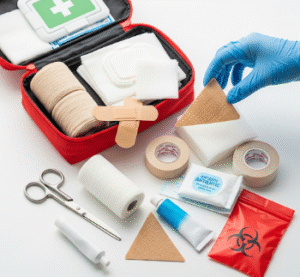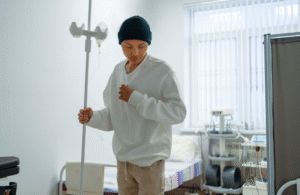Overview
Counselling is a professional, collaborative process where a trained counsellor helps an individual explore emotions, thoughts, behaviors, and life challenges to promote mental well-being and personal growth.
Importance of counselling:
- Supports emotional and psychological health.
- Helps manage stress, anxiety, depression, grief, and relationship issues.
- Facilitates personal development and coping skills.
- Provides a safe, non-judgmental space for self-exploration.
In South Korea, counselling services are widely available in hospitals, clinics, schools, workplaces, and private practices. Mental health awareness has increased, making counselling a key component of holistic healthcare.
Why It’s Done
Counselling is provided to address emotional, psychological, or behavioral concerns and support overall mental wellness.
Common reasons for seeking counselling:
- ➤ Mental health conditions: Anxiety disorders, depression, post-traumatic stress disorder (PTSD), or bipolar disorder.
- ➤ Life transitions: Career changes, relocation, or adjustment to new circumstances.
- ➤ Relationship challenges: Family, marital, or social conflicts.
- ➤ Grief and loss: Coping with death, separation, or significant life changes.
- ➤ Personal development: Improving self-esteem, decision-making, or goal setting.
- ➤ Stress management: Handling work, academic, or personal stressors effectively.
Benefits for clients:
- ✔️ Provides clarity and insight into emotions and behaviors.
- ✔️ Promotes healthy coping strategies.
- ✔️ Reduces emotional distress and improves mental health.
- ✔️ Supports behavioral changes and goal achievement.
- ✔️ Strengthens interpersonal relationships and communication skills.
Alternatives
Alternatives or complementary approaches to counselling may include:
- ➤ Psychiatric consultation: For medical management of mental health conditions.
- ➤ Self-help programs: Books, online courses, or guided exercises.
- ➤ Support groups: Peer-led groups for specific issues (e.g., bereavement, addiction).
- ➤ Mindfulness and meditation practices: Reduce stress and improve emotional regulation.
- ➤ Cognitive-behavioral self-training: Structured programs for thought and behavior management.
Key point: While alternatives exist, counselling provides structured, personalized, and professional guidance that is difficult to replicate through self-help alone.
Preparation
Effective counselling requires readiness and preparation from both client and provider.
Steps include:
- ✅ Identifying concerns: Understand the key issues or goals for counselling.
- ✅ Choosing the right counsellor: Consider specialization, approach, experience, and rapport.
- ✅ Gathering background information: Medical, psychological, and social history if relevant.
- ✅ Setting goals: Clarify what the client hopes to achieve through counselling.
- ✅ Logistics: Schedule sessions, understand duration and frequency, and prepare a private, comfortable space for virtual or in-person sessions.
Important: Preparation ensures efficient use of counselling sessions and maximizes outcomes.
How It’s Done
Counselling involves structured conversation and interventions between a counsellor and client.
Common counselling approaches:
- Cognitive Behavioral Therapy (CBT):
- Focuses on identifying and changing negative thought patterns.
- Effective for anxiety, depression, and stress-related disorders.
- Psychodynamic Counselling:
- Explores unconscious processes and past experiences influencing current behavior.
- Helps resolve deep-seated emotional issues.
- Person-Centered Counselling:
- Provides a supportive, empathetic environment for self-exploration.
- Emphasizes client autonomy and self-actualization.
- Family or Couples Counselling:
- Focuses on communication, conflict resolution, and relational dynamics.
- Addresses issues such as marital conflict, parenting challenges, or family stress.
- Group Counselling:
- Facilitates shared experiences and peer support.
- Encourages interaction and learning from others’ coping strategies.
Session structure:
- Typically 45–60 minutes per session, with weekly or bi-weekly frequency.
- Counselling may continue for weeks to months depending on client needs and goals.
- Techniques include active listening, reflection, problem-solving, goal setting, and coping skills training.
Key point: Counselling is client-centered, collaborative, and adaptable, tailored to individual needs and cultural context.
Recovery & Post-Care
Counselling aims for ongoing improvement in mental well-being, rather than a single “recovery” endpoint.
Immediate outcomes:
- Relief from emotional distress and stress.
- Increased self-awareness and coping strategies.
- Improved communication and interpersonal skills.
Long-term outcomes:
- Sustained behavioral changes and emotional regulation.
- Reduced risk of relapse for mental health conditions.
- Enhanced life satisfaction, goal achievement, and resilience.
Self-care during counselling:
- Maintain a healthy routine, including sleep, diet, and exercise.
- Engage in reflective journaling or mindfulness practices.
- Apply skills learned in sessions to daily life.
- Maintain regular follow-up sessions as recommended by the counsellor.
Important: Success depends on client engagement, consistency, and willingness to apply learned strategies.
Possible Complications / Risks
Counselling is generally safe, but certain challenges or risks may occur:
- ⚠️ Emotional discomfort: Discussing sensitive topics may temporarily increase distress.
- ⚠️ Dependency: Over-reliance on counsellor without applying strategies independently.
- ⚠️ Mismatch with counsellor: Poor rapport may reduce effectiveness.
- ⚠️ Unrealistic expectations: Expecting immediate solutions for complex problems.
- ⚠️ Privacy concerns: Breach of confidentiality, though rare in professional practice.
In South Korea, counselling services follow strict ethical guidelines, ensuring confidentiality, professional standards, and culturally sensitive approaches.
Treatment Options / Clinical Relevance in Korea
Counselling in South Korea is accessible through hospitals, private clinics, schools, and workplaces, and increasingly integrated into public health initiatives.
Key features:
- 🏥 Services offered in psychiatric and general hospitals, private counselling centers, and telehealth platforms.
- 🏥 Specialized counselling for children, adolescents, adults, and elderly populations.
- 🏥 Integration with medical treatment, therapy, and rehabilitation for mental health conditions.
- 🏥 Korean counselors are trained in culturally adapted methods for family and social context.
- 🏥 Awareness campaigns and mental health programs encourage early intervention and destigmatization.
Highlights in Korea:
- ✔️ Professional counselling improves mental well-being and quality of life.
- ✔️ Accessible for acute mental health crises and long-term personal development.
- ✔️ Integrated with holistic healthcare services in hospitals and clinics.
- ✔️ Culturally sensitive approaches ensure effectiveness and patient comfort.
- ✔️ Telecounselling provides flexible access to professional support.
Highlights
- ➤ Counselling is a professional process to improve emotional, psychological, and behavioral health.
- ➤ Indicated for mental health conditions, life transitions, relationship issues, grief, stress, and personal development.
- ➤ Alternatives include psychiatric consultation, self-help programs, support groups, mindfulness, and CBT-based self-training.
- ➤ Preparation involves identifying concerns, choosing the right counsellor, gathering background information, setting goals, and logistics.
- ➤ Approaches include CBT, psychodynamic, person-centered, family/couples, and group counselling.
- ➤ Recovery involves improved emotional regulation, coping skills, self-awareness, and life satisfaction.
- ➤ South Korea provides professional, culturally sensitive counselling services in hospitals, clinics, schools, workplaces, and online platforms.













